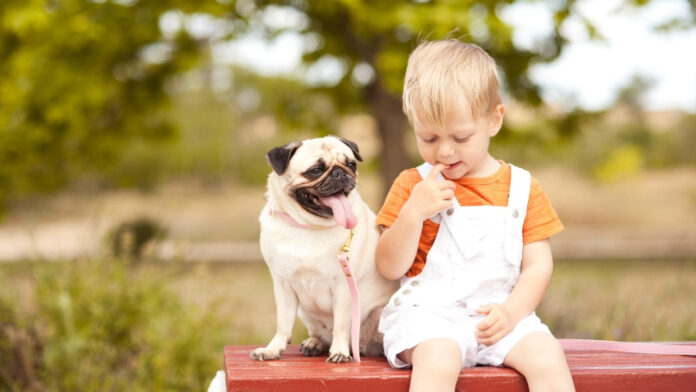Are pugs good with children? The short answer is yes – pugs are excellent family dogs that generally form wonderful bonds with kids of all ages. These compact, friendly companions are known for their patient nature and playful personality making them ideal pets for families with children.
Why Pugs Make Great Family Dogs
When looking for the perfect family dog, many parents turn to Pet like boss and other resources to research different breeds. Pugs consistently rank among the top choices for families, and there are several good reasons for this. If you’re interested in learning more about various dog breeds suitable for families, check out our comprehensive dog breed guide.
Natural Affinity for Children
Pugs possess several characteristics that make them naturally good with children:
- Patient Temperament
- Calm and tolerant nature
- Ability to handle rough play
- Good-natured personality
- Size Advantages
- Compact build (ideal for small homes)
- Not too fragile
- Strong enough for gentle play
- Social Nature
- Love for human companionship
- Friendly disposition
- Separation anxiety is rare
Safety Considerations
While pugs are generally good with children, there are some important safety aspects to consider:
Supervision is Key
- Always monitor interactions between pugs and young children
- Teach children proper pet handling
- Establish clear boundaries for both dog and child
Physical Limitations
- Breathing Concerns
- Avoid excessive exercise
- Watch for signs of overheating
- Monitor physical activity
- Eye Protection
- Protect their protruding eyes
- Teach kids to be gentle around the face
- Regular vet check-ups
Tips for Success
To ensure a harmonious relationship between pugs and children
- Training Basics
- Start early socialization
- Establish consistent rules
- Reward good behavior
- Exercise Requirements
- Daily walks
- Indoor play sessions
- Mental stimulation activities
- Health Maintenance
- Regular vet visits
- Weight management
- Grooming routine
Common Challenges
Even though pugs are good with children, some challenges may arise:
- Physical Health Issues
- Breathing difficulties
- Joint problems
- Weight management
- Behavioral Considerations
- Food motivation
- Stubborn streak
- Attention-seeking behavior
Creating the Perfect Environment
To maximize the success of having a pug with children:
- Home Setup
- Designated rest areas
- Easy access to water
- Safe play spaces
- Daily Routine
- Regular feeding schedule
- Consistent exercise
- Quality family time
- Health Management
- Temperature control
- Regular grooming
- Dental care
FAQs About Pugs and Children
Are Pugs Suitable for Toddlers?
Yes, pugs can be great with toddlers, but supervision is essential.
Do Pugs Require Lots of Exercise?
No moderate exercise is sufficient and better for their health.
Can Pugs Live in Small Apartments?
Absolutely! Their size makes them perfect apartment dogs.
Conclusion
After thoroughly examining the question “are pugs good with children,” the evidence strongly suggests that pugs make excellent family pets. Their loving nature, patience, and adaptability make them ideal companions for families with kids. However, like any pet, success depends on proper training, supervision, and understanding of the breed’s unique needs.
Remember to:- Always supervise interactions- Maintain regular health check-ups- Provide appropriate training- Create a safe environment- Show lots of love and attention
With proper care and attention, a pug can become an invaluable member of your family, bringing joy and companionship to both children and adults alike. Their naturally friendly disposition and adaptable nature make them one of the best choices for families seeking a four-legged friend.
Whether you’re a first-time dog owner or an experienced pet parent, pugs can be a wonderful addition to your family. Their loving nature and gentle disposition make them particularly well-suited for homes with children, provided you’re prepared to meet their unique care requirements and health needs.












